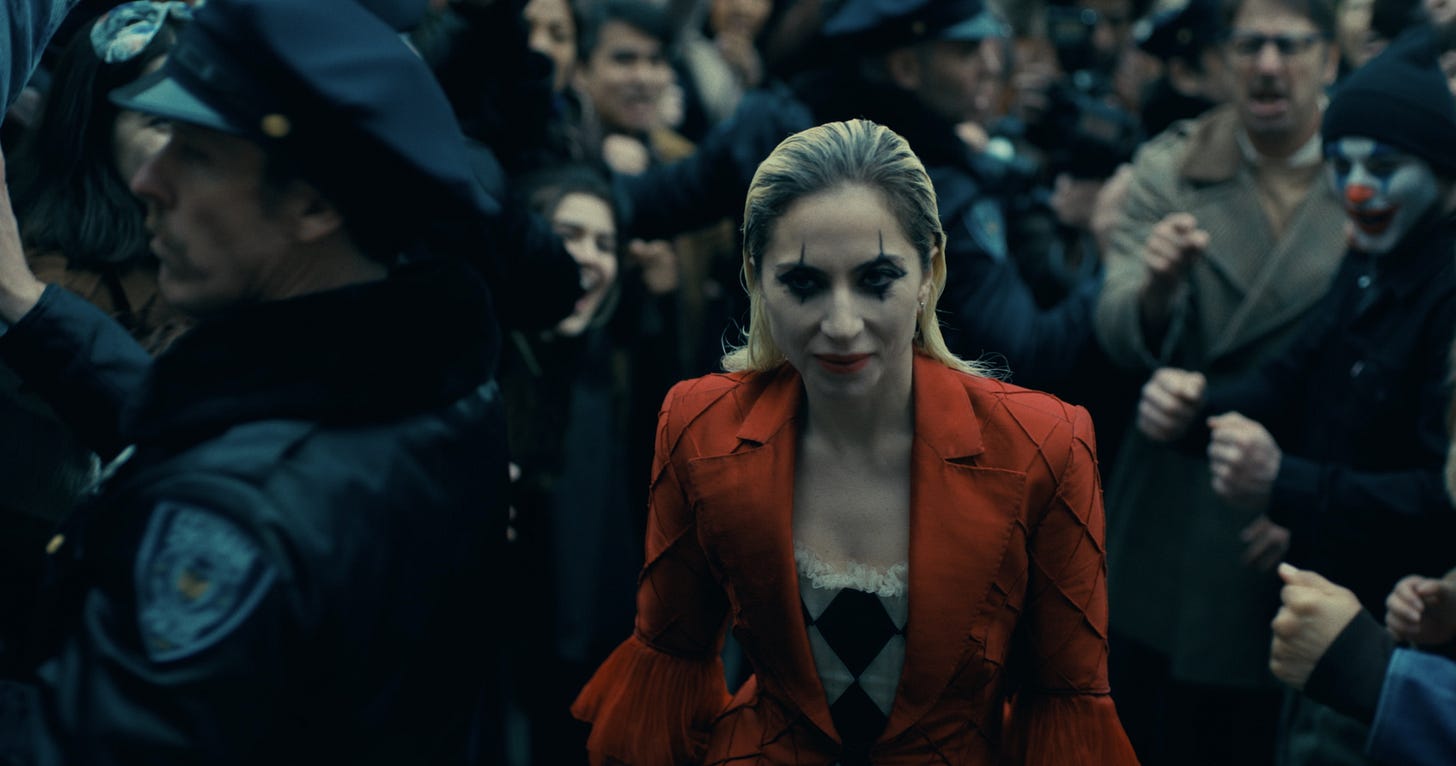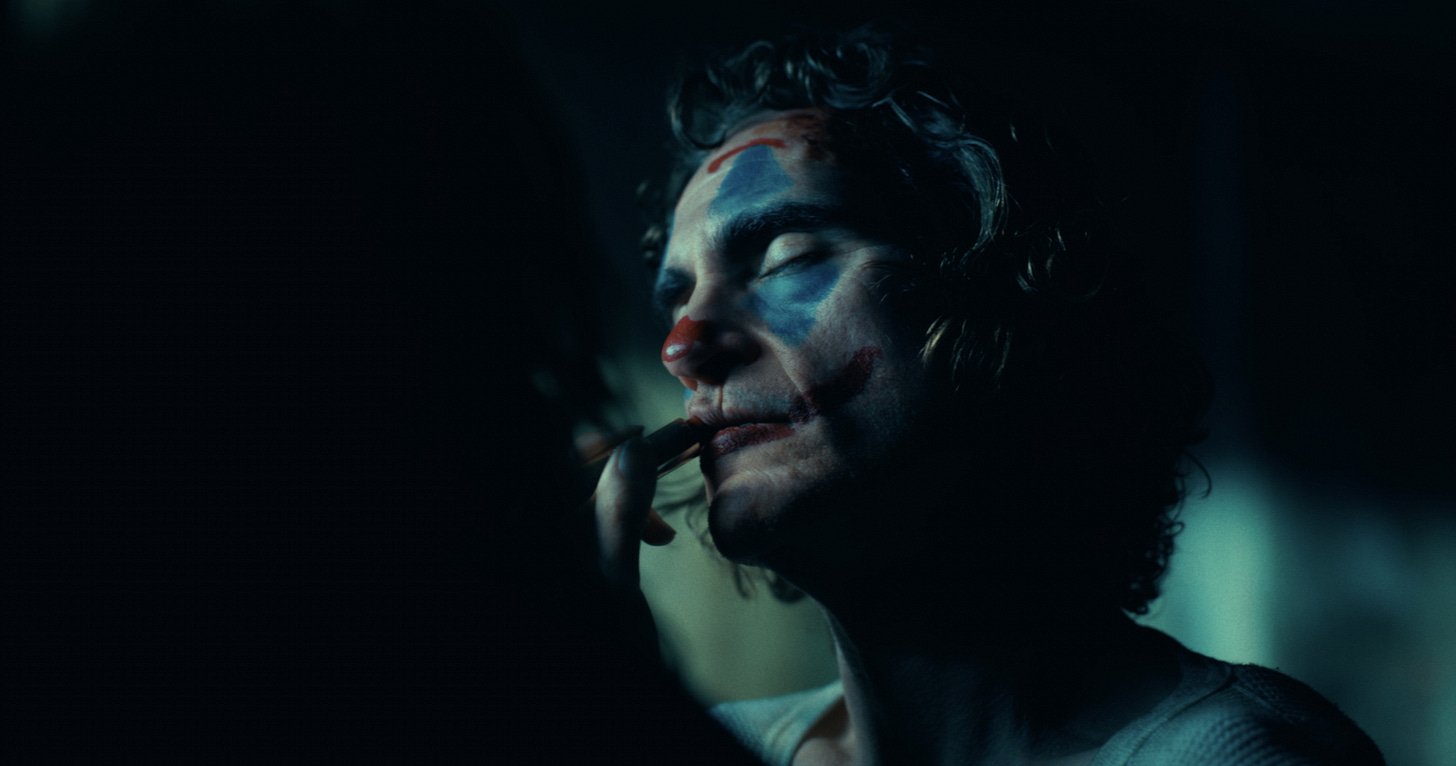Joker: Folie à Deux Review: Resentment and obligation spoil a jukebox Mad Love riff
There, Todd Phillips made a Joker sequel. Happy now?
People are uncorked whenever The Joker gets brought up in conversation. He just gives off a bad vibe, and that's why fans of the Clown Prince of Crime are often viewed as oddballs in comic circles: "You're into the guy who murders for fun?" "Yes, because he's an agent of chaos, etc." (Usually how these conversations go.) I get it; I like horror movies and have been known to enjoy Freddy Krueger. There's a certain appeal to watching a fictional (important word in these conversations) character get up to a bit of mayhem while maintaining a healthy sense of humor. People may avoid you on trains and at parties, but hey — like what you like, just tread lightly.*
The villain is fun! In most cases, more so than their heroic counterparts. Batman is entertaining when he's allowed to be weird, off-putting, or silly; more often, Warner Bros. and DC prefer we take him seriously. So Joker picks up the slack in the charisma department, which is another part of the villain's appeal: the role attracts interesting, charismatic actors like Jack Nicholson, Heath Ledger, and most pertinently, Joaquin Phoenix, whose crack at the character netted a billion-dollar box office haul and an Academy Award. Todd Phillips' Joker (2019) wasn't especially interesting, but no one will say it didn't succeed where it counted. Joker Stans flooded multiplexes, everyone else casually shrugged at it, but all were in agreement: Phoenix made Joker better than it had any right to be.**
Did there need to be a sequel? Warner Bros. beancounters thought so. And their irrational desire to double-down on a gigantic hit to diminishing returns isn't the only destructively chaotic energy emanating off of Joker: Folie à Deux; the creative freedom WB gave Todd Phillips, who made Joker with open resentment towards comic book adaptations yet couldn't turn Joker into anything beyond a Scorsese pastiche, is reminiscent of the carte blanche WB gave Tim Burton to make Batman Returns. It worked out for the oddballs (I love Batman Returns), but the critics and moviegoers of the day largely rejected it.
Joker: Folie à Deux isn't transgressive enough to be compared to a naughty, cash-flush experiment like Returns, nor do I think it will enjoy reappraisal anytime soon. Burton isn't just a more fascinating director than Phillips; he made Returns with a mind to improve on the things he accomplished in his first movie while imprinting his unique vision on Batman.*** Phillips' hollow reprise of Joker feels like a compromise and a victim of the director's success. Sure, it made too much money to be left alone, but had Phillips (who co-writes again with Scott Silver) been similarly passionate about the Joker**** or even respected the howling masses who made the first movie such an unqualified success, you'd be reading about the prospects of Joker 2 right now instead of me writing around them.
So what, if any, are the qualities of Joker: Folie à Deux? Phoenix, who we know can sing (Walk the Line) and has indomitable screen presence (everything else), acquits himself well in the rare instances where Folie à Deux wanders from its gross Arkham trappings to be the Merrie Melodies riff on Mad Love it always seems to be on the verge of becoming. Lady Gaga as "Lee" Quinzel, the film's ersatz Harley Quinn, adds some life to Phillips' mopey take on Gotham City; the film shows its few true sparks whenever Gaga is free to flex her vocal range and Phoenix can flail around like some Satanic jack-in-the-box. But these scenes are rare, either because Phillips doesn't quite know how to establish and maintain the sweep of a movie musical or has no serious interest in making one. Still, Brendan Gleeson gets to sing (he plays a mean Arkham guard), and any movie where Brendan Gleeson sings can't be all bad.
The musical aspect of Folie à Deux is the only serious connection Gaga and Phoenix share in the movie. Part of this is because Gaga doesn't have much to do as Quinn. Her role in Joker's story is to be his biggest fan, and whatever conflict she brings about either turns out to be bullshit, largely occurs offscreen, or takes place inside the Joker's love-addled mind. The shared madness Arthur inspired in Gotham, which is supposed to give this movie a feeling of dread and inevitability — folie à deux times a million — is similarly faint until it crashes into its ending with the subtlety of the Kool-Aid Man.
Quinzel, like much of the denizens of Gotham at the end of Joker, was captivated by Joker’s earnest if murderous performance on The Murray Franklin Show and contrives a way to ingratiate herself with him through the power of music. She encourages Arthur Fleck (Joker out of makeup) to break out of Arkham to have what fans will recognize as Joker & Harley comic-friendly shenanigans. Instead, Phillips frames her as a surrogate for the Joker fandom, and — after a couple hours of bewildering speeches, songs, and betrayals — her character endures little more than bitter disillusionment for her trouble. Her director is sympathetic; if Joker was Phillips working around superhero fodder to get a "serious" movie made, then Folie à Deux is him killing the monster he helped create to chase something, anything else.
If there's a message to be gleaned from all this, it's that Todd Phillips feels everyone got the wrong message from his thematically confused Joker movie and resents having to make a sequel that appeals to the same people. This disdain makes the ending impressive in its disappointment and emptiness. I almost admire the sneer he shows in demystifying Phoenix's version of the Joker character and making those who admired him out to be fools. When we finally see the fully realized version of Joker in Folie à Deux, not in his dreams but in courtroom sequences where Arthur winds up defending himself, he feels diminished, unconvinced that makeup makes the man — or that madness is what inspires his mayhem. But Joker 2 isn't some subversive treatise about taking responsibility for your actions; it's about giving people who have inconvenienced its director what he feels they deserve. I’m sorry, that's entertainment?
3.5 / 10
* Call it “The Patrick Bateman Effect." This causes the patient to idolize villainy while glossing over its knottier implications (i.e., what villains do and who they do it to, which leads to the knottier “why they do it”). This often results in earnestly quoting the villain at inappropriate moments, professing uninteresting or revealing anti-art/pro-content sentiments on social media/flesh space in front of friends, colleagues, and loved ones, and possibly some cosplay. (Symptoms may vary.)
** If there’s no Batman in a Joker movie, then what’s the point? What do you mean, “there isn’t one”?
*** Also, bondage.
**** I felt really stupid writing that.
Joker: Folie à Deux is in theaters now.
Directed by Todd Phillips.
Written by Scott Silver and Todd Phillips.
Cinematography by Lawrence Sher.
Starring Joaquin Phoenix, Lady Gaga, Brendan Gleeson, Catherine Keener, and Zazie Beetz.
Produced by Todd Phillips, Emma Tillinger Koskoff, and Joseph Garner.
Rated R for prison violence/sex and mad/sad clown language.




